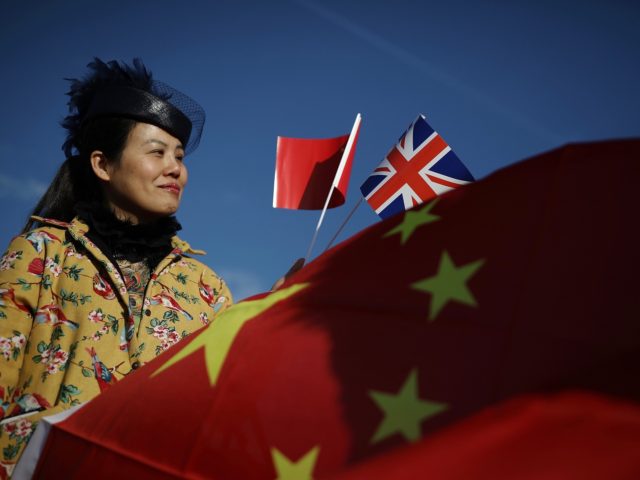Prime Minister Boris Johnson will seek “deeper trade links” with China, according to the new ‘Global Britain’ policy paper released on Tuesday.
The British government will look to increase security surrounding critical infrastructures like the national power grid, water supplies, and transport networks in order to open a path to increase economic ties with the communist country.
The 109-page review entitled ‘Global Britain in a Competitive Age’ is being dubbed as the biggest foreign policy adjustment for the UK since the Cold War, according to The Times.
The review acknowledges that the Chinese government represents the “biggest state-based threat” to Britain’s economic security as well as posing a “systemic challenge” to British values.
Yet, the policy paper goes on to say that the UK should still seek to court the regime in Beijing in order to gain “deeper trade links and more Chinese investment”. Investment from China has already seen at least seventeen independent schools being bought up by Chinese billionaires with ties to the governing Communist Party.
The British government will say that it will “not hesitate” to stand up for its values over human rights abuses being carried out by the CCP against the Uyghurs in Xinjiang or the vicious clampdown on the pro-democracy movement in the former British colony of Hong Kong.
However, Foreign Secretary Dominic Raab — who has pledged to work with the communist regime on issues such as climate change — said that the UK should not adopt an “old, outdated Cold War mentality with China”.
Summarising the new British approach to China, the government’s positioning document said:
China’s growing international stature is by far the most significant geopolitical factor in the world today, with major implications for British values and interests and for the structure and shape of the international order. The fact that China is an authoritarian state, with different values to ours, presents challenges for the UK and our allies. China will contribute more to global growth than any other country in the next decade with benefits to the global economy. China and the UK both benefit from bilateral trade and investment, but China also presents the biggest state-based threat to the UK’s economic security.
We will require a robust diplomatic framework for this relationship that allows us to manage disagreements, defend our values and preserve space for cooperation where our interests align. China is an increasingly important partner in tackling global challenges like pandemic preparedness, biodiversity and climate change. We will continue to pursue a positive economic relationship, including deeper trade links and more Chinese investment in the UK. At the same time, we will increase protection of our CNI, institutions and sensitive technology, and strengthen the resilience of our critical supply chains, so that we can engage with confidence. We will not hesitate to stand up for our values and our interests where they are threatened, or when China acts in breach of existing agreements. The UK has responded to China’s actions in Hong Kong by creating a new immigration route for British Nationals (Overseas) and their eligible family members and dependents, and to China’s human rights violations in Xinjiang through measures to ensure that British organisations are neither complicit in nor profiting from them.
In response to the paper, the founder and chairman of Hong Kong Watch, Benedict Rogers told Breitbart London: “To talk of deepening trade links at this time is extraordinary. We should be diversifying our trading relationships and supply chains around the world, recalibrating our policy towards China and prioritising our values and security against a regime that has proven time and again that its word cannot be trusted.”
“After a year in which we have seen the Chinese Communist Party regime tear up an international treaty over Hong Kong, be accused of genocide against the Uyghurs, be responsible for inflicting a pandemic on the world as a consequence of its mendacity, cover-up and repression, and behave in increasingly aggressive ways through its ‘wolf-warrior diplomacy’, one would have thought that the UK would have woken up to the challenges in dealing with this regime,” Rogers added.
Conservative MP Tobias Ellwood said on Tuesday that the review is ambitious in its scope, but said that it fails to properly understand the economic threats posed by the Chinese state.
Ellwood told TalkRaido that China has “taken advantage” of the “risk-averse” Western nations, which have failed to challenge the CCP economically.
China has “rewritten the World Trade Organization rules and when are we going to wake up and recognise where that is taking us and that is the piece that I think is missing from this document,” the Conservative MP said.
The former head of MI6, Sir Alex Younger also expressed doubt that increasing economic ties will lead to a liberalising of the communist nation.
“The idea that China will become more like us as it gets richer or as its economy matured is clearly for the birds,” Younger said in a BBC Radio 4 interview.
“That’s not going to happen. On the contrary, I expect China’s Communist Party to double down on its ideology in the future. There’s going to be an ideological divergence between us in the future, that’s going to generate rivalry and reduce trust,” Sir Alex warned.
How exactly Boris Johnson’s government intends to secure critical infrastructure and technology from the Chinese threat remains to be seen. British Universities, in particular, have recently been swept up in controversy for working with Chinese military weapons developers, reportedly prompting an investigation from the MI6 security services agency into “some of the most prestigious universities in the country”.
Follow Kurt Zindulka on Twitter here @KurtZindulka

COMMENTS
Please let us know if you're having issues with commenting.